A Taste of Soup Noodle in Luzhou
Stories by Lian-fu Yang
Seniors of the Ancient Taste of Luzhou An Interview with Mr. Lian-fu Yang of the Luzhou Museum |
|
Mr. Lian-fu Yang of Luzhou Museum is a scholar who focuses his attention on the cultural industry of Luzhou for a long time. Hence he has profound understanding of the framework and changes of the traditional culture of Luzhou and great enthusiasm for the promotion of the traditional industry. We, Lu Jiang Cyberfair Team, visited Luzhou Museum and were greeted by many representative objects and old photos. While listening to Mr. Yang, a senior Luzhou resident, it seemed that we had sat in a time machine, arrived at the front of the temple of Luzhou in the 1960s, and heard the sales calls of Soup Noodle... |
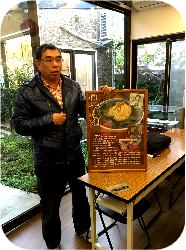 |
Miaokou Culture & Soup Noodle (Miaokou Culture: The culture which comes into being in the fair in front of a temple)
Long long ago... As early as over 150 years ago, a monk brought along a statue of Guanyin, a Buddhism goddess, to Taiwan. Luzhou residents worshiped Guanyin to pray for the success of business and built a temple for the goddess. Later, as its believers grew, the temple was expanded, which is Yonglian Temple. The current appearance of Yonglian Temple is the results of several renovations. Besides the three major ceremonies (namely, the birthday celebration of Guanyin on the 19th day of the second month, the ceremony of the enlightenment of Guanyin on the 19th day of the sixth month, and the ceremony of Guanyin becoming a nun on the 19th day of the ninth month in the Chinese Han calendar), the Buddha Tour is a grant event in Luzhou held on 18th day of the ninth month in the Chinese Han calendar. |
|
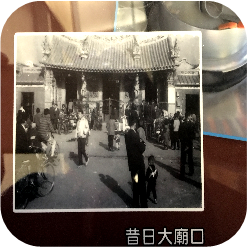 |
|
| A fair formed over 150 years ago... | |
Yonglian Temple Miaokou was busy as early as 120 to 130 years ago. Some ran a school here. Some built a billboard here. Why billboard? The official institution of greater Taipei area was located in Hsinchuang at the earliest and moved to Monga (today's Wanhua) later. As the surrounding of Yonglian Temple was busy, the billboard was built to inform people about house rents. |
|
| Yonglian Temple, since the Qing Dynasty, has been the center of Luzhou in terms of beliefs, economy, society, and education. For economy, residents from Wuku and Pali and from Kengliao and Ciwei (where today's Pi Hua Elementary School and Wu Hua Elementary School are located) came here to buy or sell groceries. Thus, Yonglian Temple Miaokou became a hub for trading commodities. | |
| Century-old shops emerged in the prosperity… | |
Since the arrival of the statue of Guanyin to Yonglian Temple, a fair covered the area from Desheng Street to Chenggong Road. It was so prosperous that people who wanted to run a shop or do other businesses all came here. Where was the prosperity manifested? There were several century-old pastry shops in Luzhou, including Long Fong Tarng, Lee Cake, Jin Tang Shing, and Lu Sheng Fa. Though they have been moved from Luzhou to Dadaocheng or other places, over 100 years ago, they were directly opposite to Yonglian Temple, selling pastries with booming business! |
|
| Taiwanese like noodles... | |
Why do Taiwanese people like eating noodles? Why did this delicacy of the north come to Taiwan? Or to Luzhou? "Noodle" used to be the staple of the north, made from, while the staple in the south was "rice". In the Qing Dynasty, many Fujianese immigrants to Southeast Asia and brought along their staple to the south. Along with the development of history, food culture changes. Hence, noodle was introduced to the north from the south. |
|
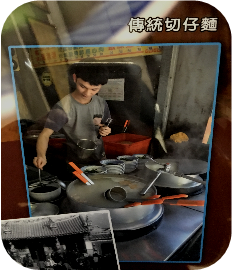 |
|
Luzhou residents like noodles... |
|
Because workers there do hard manual work, when they become hungry, they want to have their breakfast or supper immediately. Luzhou people eat noodles and salty porridge for breakfast. The shop owners of salty porridge learned their cooking skills from Chien Cheng Circle, Taipei where rich people have it for breakfast. The residents in Taiwan who are fond of noodles mostly live in port areas, like Keelung, Anping, Tamsui, and the like. |
|
Why in port areas? In terms of Luzhou, 80 or 90 years ago, during the period of Japanese occupation, Wu-ru Lin was selling Soup Noodle. One should sell Soup Noodle in a fair or other busy place. Rich people would afford it because they had jobs and salaries. Farmers might not be able to do so. |
|
| The Experience in the 1960s | |
Soup Noodle stalls beside the Yonglian Temple… |
|
Since he started to sell Soup Noodle outside Yonglian Temple, more and more people came here in the 1960s. He set up a simple shed with plastic cloth and began selling Soup Noodle. His stove was like a cooking stove in ancient times with two cauldrons, one for stewing pork bones soup and the other for cooking appetizer dishes. I remember that when I was a child, adults would have noodles sitting in the stalls, while kids would play and eat. The scene is the same as that in front of Zushi Temple in Wanhua with many stalls selling snacks. |
|
| How do Luzhou people cook noodles... | |
The method to cook noodles: Stew soup with pork bones. Select handmade oil noodles without borax. In the early days, two pieces of meat were added. Later, meat balls, bean sprouts, or Chinese chives are added, which is the most authentic. Then, the noodles are sprinkled with sauces made by secret recipes of shop owners. |
|
Inheritance of the Past |
|
| The Inheritance of Luzhou Soup Noodle… | 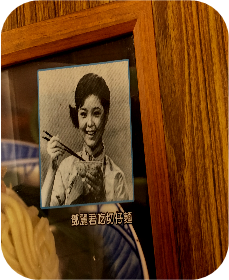 |
Later, Wan-pao Yang became old, so he handed over his business to his apprentices, including Atzu, Acheng, Tienting, Damiaokou, and so on. Luzhou Soup Noodle or Hanshangchou Soup Noodle was famous for a while in Tachih and Sanchung, which were ran by the apprentices of Wan-pao Yang. In Luzhou, Asan Soup Noodle has the same history as them. Asan ran his shop in the wetland park of Erchong Floodway previously. |
|
| Another system is Aliu Soup Noodle. The shops of this system also were run in the stalls in the wetland park of Erchong Floodway. Though they have moved away from their original locations, most are still settled in Luzhou District. | |
| The reputation of Luzhou Soup Noodle… | |
Why Luzhou Soup Noodle was so famous? First, it was the type of breakfast with unique characteristic for people in the past. Second, Luzhou covers a small area of 7.9 square kilometers, but it boasts many Soup Noodle shops. Compared with other regions, it has more Soup Noodle shops. Third, over 11 or 12 years ago, when Mr. Lian-fu Yang and Ms. Li Weng promoted "Luzhou Culture with Characteristics", they emphasized greatly the culture of Guanyin. |
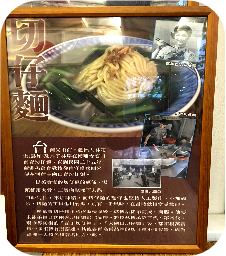 |
The exhibitions of Guanyin statues were held frequently then. Even Ming Hwa Yuan Arts and Culture Group had been invited to perform. Since Yonglian Temple and Luzhou District Office had their respective activities, the event of "Luzhou Culture with Characteristics" was held for one or two sessions and replaced by "Soup Noodle Carnival". "Soup Noodle Carnival" started 7 or 8 years ago and was held in Luzhou and Banqiao. Many media were invited to widely publicize, so people became aware of Luzhou Soup Noodle. Later, the carnival turned into "Deities Cultural Festival". In summary, this is the whole promotion and evolution of Soup Noodle in Luzhou. |
|
| Our Concerns and Gains | |
| The representative significance of Luzhou Soup Noodle... | |
Q: Mr. Yang, can Soup Noodle represent the characteristics of Luzhou? |
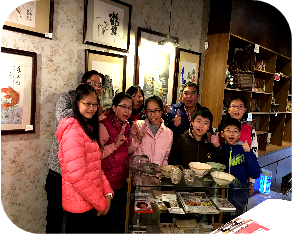 |
If we want Luzhou Soup Noodle to be passed down constantly, besides the preservation of its characteristics, we shall think if we can add the features of different regions in it just like what Japanese have done to La Mien (hand-pulled noodles). On the other side, the shop owners in Luzhou must endeavor to add new ideas to make a difference. Like Japanese La Mien, it not only retains the tradition, but also is presented in diversified ways with new tastes, flavors, and ornaments. This is the key point for the sustainable development of Luzhou Soup Noodle. |
|
Q: Mr. Yang, what methods we can use to truly promote Luzhou Soup Noodle to the outside? Today, developed technologies like the Internet allow information conveyed more smoothly. We shall take advantage of these convenient channels to truthfully record and report with detail the 70 or 80 years of history of Luzhou Soup Noodle. We shall also work with our local shop owners to distinguish Luzhou Soup Noodle from that of other places. Consequently, the whole world will know Luzhou Soup Noodle which has its own characteristics and distinguishes its own from the other Soup Noodles in other regions of Taiwan. |
|







